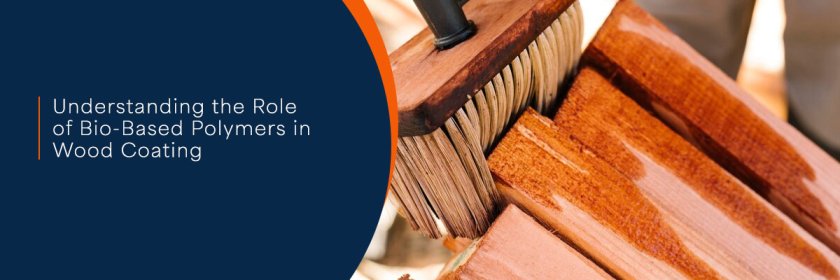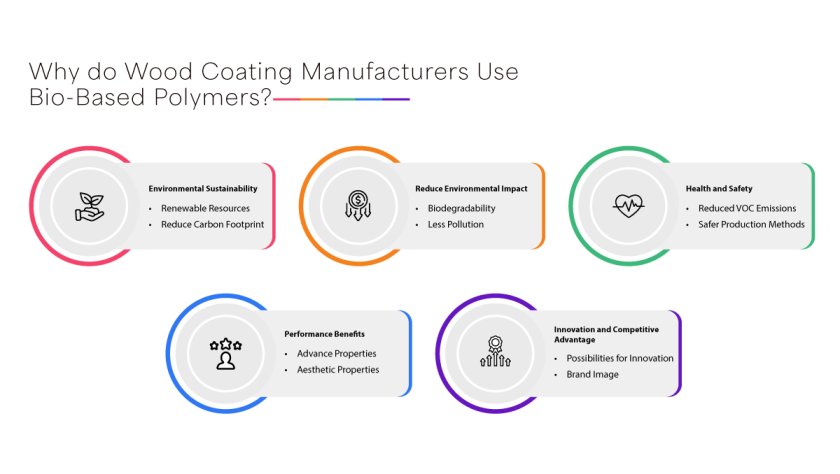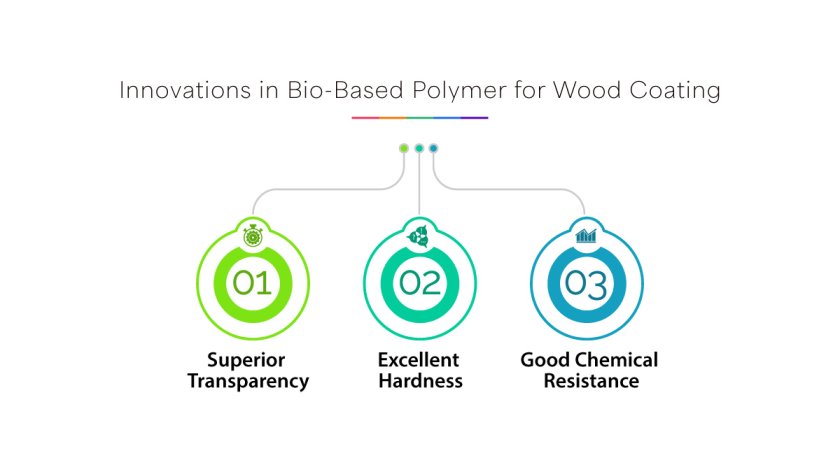Introduction
Bio-based polymers are materials derived from renewable biological resources, such as plants, animals, or microorganisms. Unlike conventional polymers, which are typically derived from fossil fuels, bio-based polymers offer a more sustainable and environmentally friendly alternative. They can be used in a wide range of applications, from packaging and textiles to automotive and biomedical industries.

Why Wood Coatings is Needed?
Conventional wood coatings have long been the standard in the industry, mostly based on synthetic polymers made from fossil fuels. They are protective and aesthetically pleasing, but they have a lot of disadvantages. Hazardous chemicals endanger both human health and the environment, while volatile organic compounds (VOCs) are a contributing factor to air pollution and problems with indoor air quality. Furthermore, the limited availability of fossil fuel supplies emphasizes how urgent it is to switch to sustainable alternatives.

Understanding the Role of Bio-Based Polymers in Wood Coatings
Bio-based polymers are revolutionizing the wood coatings industry by providing environmentally acceptable and sustainable substitutes for conventional petrochemical-based products. These polymers considerably lessen the dependency on fossil fuels and the carbon footprint of wood coatings because they are sourced from renewable resources such as plants, agricultural byproducts, and microorganisms.
Bio-based polymers are mostly used as binders in wood coatings, which are vital for maintaining the adhesion of the pigment and other ingredients to the wood surface. Polylactic acid (PLA), polyhydroxyalkanoates (PHA), and modified starches are examples of common bio-based binders. These substances give the wood the required film-forming qualities to shield it from environmental harm, such as moisture, UV rays, and mechanical wear.
The utilization of bio-based polymers in wood coatings has significant advantages, one of which is their capacity to promote environmental sustainability. Furthermore, a large number of bio-based polymers are biodegradable, which allows coatings constructed of these materials to decompose organically over time and minimize long-term environmental damage.
Additionally, there are safety and health benefits associated with bio-based polymers. Volatile organic compounds (VOCs), which can be detrimental to the environment and human health, are frequently found in traditional wood treatments. VOC emissions can be greatly decreased, or even eliminated, with the use of bio-based polymers, improving indoor air quality and creating a healthier living environment.
Innovations in bio-based polymer technology have produced coatings that are just as durable and aesthetically pleasing as conventional goods, if not more so. These coatings offer superior adherence, flexibility, and resistance to moisture and UV light, guaranteeing long-lasting protection and bringing out the wood's inherent beauty.
However, there are obstacles to overcome, such as increased production costs and the requirement for reliable performance. The goal of ongoing research and development is to resolve these problems and improve the dependability and cost-effectiveness of bio-based wood coatings. The use of bio-based polymers in wood coatings is anticipated to grow, spurring innovation and promoting a greener future in the coatings industry as governmental support and consumer demand for sustainable goods increase.

Why do Wood Coating Manufacturers Use Bio-Based Polymers?
Wood coating manufacturers use bio-based polymers for a number of compelling reasons, most of which are related to sustainability, environmental effect, health and safety, and performance advantages. The following are the main drivers:
Environmental Sustainability
- Renewable Resources: Plants and agricultural waste are among the renewable biological sources from which bio-based polymers are produced. By doing this, dependency on finite fossil fuels is lessened, and the growth of a more sustainable materials economy is encouraged
- Reduced Carbon Footprint: Compared to conventional petrochemical-based polymers, the manufacture of bio-based polymers often produces reduced greenhouse gas emissions, which helps to slow down global warming Biodegradable polymers reduce carbon footprints by utilizing renewable resources that sequester CO2 during growth. Their production emits fewer greenhouse gases compared to fossil-based plastics. Additionally, their degradation minimizes long-term environmental impact and methane emissions from landfills, contributing to a more sustainable carbon cycle.
To know about the Global Biodegradable Polymer Market, kindly visit the link below:- https://www.databridgemarketresearch.com/reports/global-biodegradable-polymer-market
Reduced Environmental Impact
- Biodegradability: A large number of bio-based polymers can naturally decompose into innocuous compounds. By doing this, long-term environmental pollution is decreased, which is particularly significant for goods that eventually wind up in landfills. Biodegradability in bio-based polymers is a critical topic, especially considering the increasing environmental concerns related to plastic waste. Bio-based polymers are derived from renewable biological sources such as plants, animals, or microorganisms, and they offer an alternative to conventional petroleum-based plastics
To know about the Global Bio-Based Polymer Market, kindly visit the link below:- https://www.databridgemarketresearch.com/reports/global-bio-based-polymer-market
- Less Pollution: During production and disposal, bio-based polymers usually produce fewer environmental pollutants, which helps to maintain cleaner air and water
Health and Safety
- Reduced VOC Emissions: Volatile organic compounds (VOCs), which are linked to indoor air pollution and may be hazardous to human health, are frequently found in traditional wood coatings. VOC emissions can be greatly decreased or eliminated with the use of bio-based polymers, improving indoor air quality
- Safer Production methods: Compared to petrochemical-based methods, the manufacturing of bio-based polymers frequently uses fewer hazardous chemicals, lowering the possibility of hazardous worker exposures
Performance Benefits
- Advanced Properties: Materials that can match or even surpass the performance of ordinary polymers have been made possible by developments in bio-based polymer technology. They provide superior adherence, flexibility, and resilience to moisture and UV rays, among other environmental conditions
- Aesthetic Properties: Clear, glossy, or matte finishes that accentuate the wood's grain while shielding it from harm are some of the ways that bio-based wood coatings can bring out the natural beauty of wood
Innovation and Competitive Advantage
- Possibilities for Innovation: By using bio-based polymers, producers can create fresh, cutting-edge goods that set them apart from competitors
- Brand Image: Businesses can improve their brand image and attract environmentally conscious customers by implementing sustainable procedures and materials

Innovations in Bio-Based Polymers for Wood Coatings
The recent developments in bio-based polymers have opened up new avenues for the formulation of wood coatings with improved characteristics. For instance, PC-Mull 815, a biobased acrylic copolymer for high-performance furniture and wood treatments, was introduced by EPS - Engineered Polymer Solutions and is accessible in the EMEIA markets. For use as a self-sealing resin and topcoat in upscale interior wood 1K applications, PC-Mull 815 is perfect. This bio-based polymer ensures that coated substrates won't be harmed when stacked because it is made to meet strict chemical resistance standards and offers block resistance. This polymer has a calculated biobased content up to 15%, and extensive research went into ensuring a performance comparable to that of 100% fossil-based products.
In addition, the important domains of innovation consist of:
- Superior Transparency: The opacity of traditional wood treatments can reduce the organic beauty of wood surfaces. On the other hand, novel bio-based polymers with good film-forming qualities, such as cellulose derivatives and lignin-based resins, provide increased transparency. Through the application of surface modification techniques and nanotechnology, researchers have produced bio-based coatings with amazing clarity that improve the visual attractiveness of wood surfaces
- Excellent Hardness: In high-traffic areas or outdoor applications where surfaces are exposed to wear and abrasion, durability is a crucial component of wood coatings. Bio-based polymers, such as polyurethanes made from natural oils, are just as scratch- and hardness-resistant as conventional synthetic coatings. Moreover, bio-based reinforcements such as cellulose nanocrystals and plant-derived fibers enhance the mechanical properties of coatings, ensuring long-lasting performance without compromising sustainability
- Good Chemical Resistance: Wood coatings must be able to endure exposure to a wide range of chemicals without losing their integrity, such as solvents, water, and household cleaners. Bio-based epoxies and polyhydroxyalkanoates (PHA), which are bio-based polymers with built-in chemical resistance, provide better defense against chemical deterioration. Furthermore, natural antioxidants and antimicrobials found in bio-based additives such as tannins and plant extracts increase the chemical resistance of coatings while having the least negative effects on the environment
Obstacles and Prospects for the Future
Supply chain optimization, infrastructure development, and research expenditures are necessary to meet industry demand for bio-based polymers. The cost-competitiveness with synthetic alternatives still hampers widespread adoption. Additionally, for bio-based coatings to be safe and effective, compliance with certification requirements and regulatory standards is crucial. Innovative product launches need manufacturers to maneuver through intricate regulatory environments. Working together with the various end-user company, government, business, and academia can drive innovation and get over technological obstacles in the near future.
Conclusion
Innovation in bio-based polymers is poised to transform the wood coating industry, offering sustainable solutions that prioritize transparency, hardness, and chemical resistance. By harnessing the power of nature, coating manufacturers can meet the evolving needs of consumers and address environmental challenges without compromising performance. As research and development efforts continue to accelerate, bio-based polymers hold the key to a more sustainable future for wood coatings and beyond.



